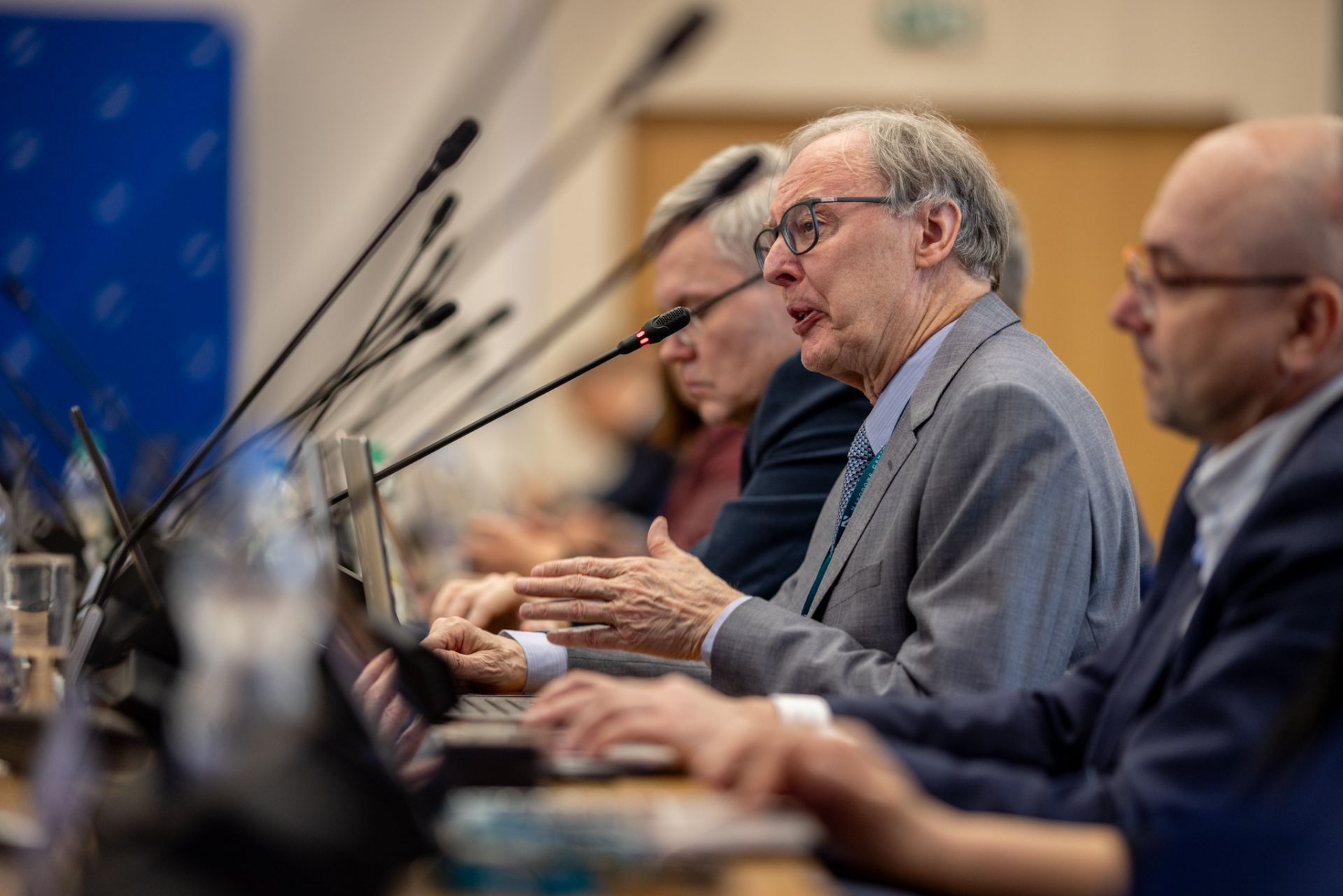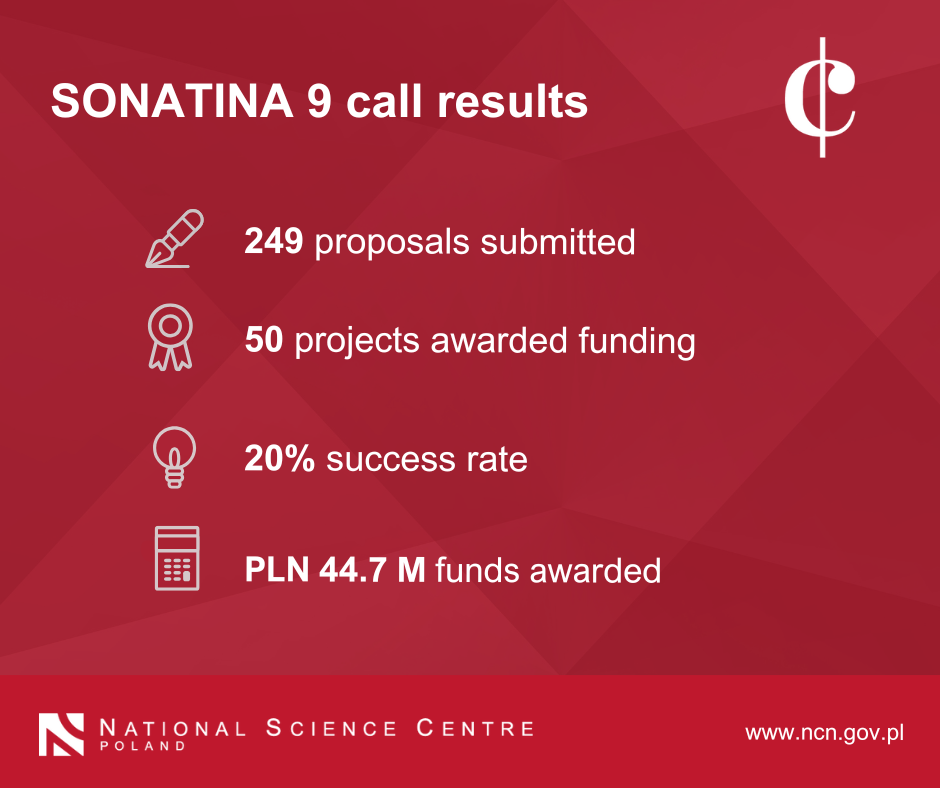This is not the Future – it's Happening Now. Seniors on Life in Ever-Hotter Cities.
The guest of #rozmowaNCN series is Dr Zofia Boni, a social anthropologist from the Institute of Ethnology and Cultural Anthropology at Adam Mickiewicz University in Poznań, who studies how senior citizens experience and cope with heatwaves.
Climate change isn’t just about models and forecasts – it’s also part of people’s everyday lives. Project “Experiencing Climate Change: A Transdisciplinary Research of Urban Overheating” (EmCliC), led by the team of Dr Zofia Boni, focused on how heatwaves affect the lives of older urban residents. The research was conducted in Warsaw and Madrid – cities with different climates and histories of adapting to high temperatures.
The researchers asked seniors how they experience heatwaves, how they cope with them and how the heat affects their health. By combining social and natural science methods and using new technologies, they created a multidimensional picture of everyday life in a changing climate. The research project was complemented by the activities of the Science and Society initiative, which allowed the team to share their findings with senior citizens and community organisations and to establish closer cooperation with Warsaw City Council.
Anna Korzekwa-Józefowicz: Which district of Warsaw offers the best quality of life for seniors, considering climate change?
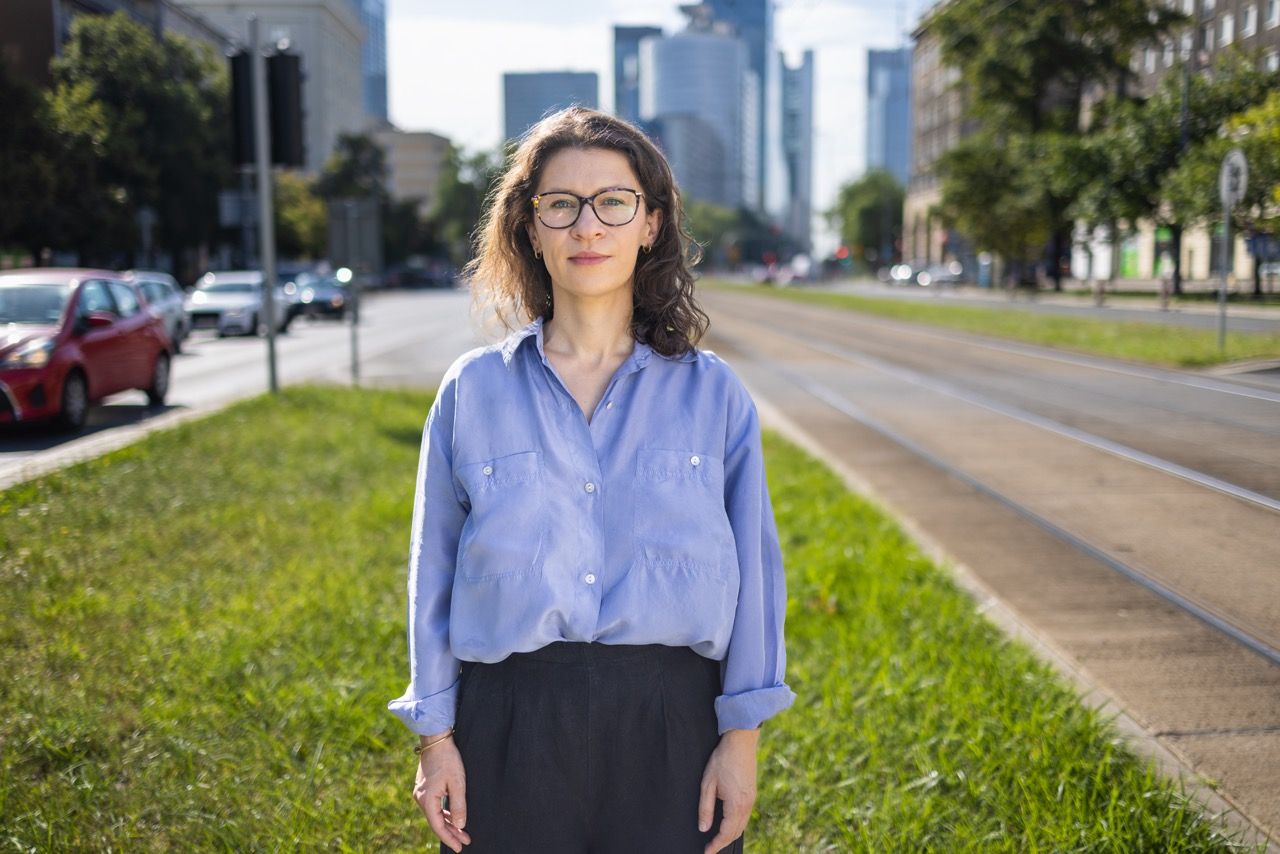 Zofia Boni, credit: M. Łepecki/NCN
Zofia Boni: It’s actually easier for me to say which districts seniors avoid in the summer – because that clearly emerged from our research. The people we interviewed said they deliberately steer clear of the city centre. They change plans – doctor’s appointments, administrative errands, meetings with family and friends – all just to avoid being in the city centre during the heat.
Zofia Boni, credit: M. Łepecki/NCN
Zofia Boni: It’s actually easier for me to say which districts seniors avoid in the summer – because that clearly emerged from our research. The people we interviewed said they deliberately steer clear of the city centre. They change plans – doctor’s appointments, administrative errands, meetings with family and friends – all just to avoid being in the city centre during the heat.
So where do they seek relief, and what strategies do they use to cope with the heat?
Many people talked about local parks – depending on where they live – as places that can be genuinely pleasant. Especially if they are a bit further from the centre or even outside the city, like Kampinos Park.
Some – those who could afford it – also mentioned buying allotments, especially community gardens within the city. Or they even mentioned plots outside the city and summer trips as strategies for coping with the heatwave.
This is, in fact, a solution we observe in other European cities as well, but it is mostly available to people in privileged situations. Because not everyone can afford to buy a plot and spend the entire summer outside the city.
When temperatures rise, the media often issue warnings, mainly aimed at seniors, not to leave their homes.
Staying indoors is also an adaptive strategy, but – as our research showed – it’s not always effective. Some participants noted that spending entire days inside, even in shaded apartments, negatively affected their physical and mental well-being. There was a feeling of isolation, depression.
Moreover, although many apartments provide relief from the heat, some become very hot and even dangerous. That’s why some said they spent their days in supermarkets or shopping malls – simply because it was cooler there. However, they stressed that it was a frustrating experience. Walking around the store, unwilling or unable to spend money, was not a form of rest for our participants – it was a survival strategy.
Discussions about climate change most often focus on its impacts on future generations. Your team focused on seniors. What was the reason for choosing this particular group?
Indeed, the dominant narrative still holds the belief that the effects of climate change will only arrive in the future. And in this sense, they will affect future generations. However, our goal was to show that these changes are not a distant prospect but something happening right now and experienced daily – as in the case of the heatwaves we studied. And the consequences are felt most strongly by those particularly vulnerable to heat stress, including seniors. Using a variety of methods, we therefore looked at how older adults cope with heat, how they perceive it, how they respond and how they adapt.
What methods were used?
The project employed an interdisciplinary approach, combining climate and epidemiological modelling – used to analyse the impact of heat on older people’s health – with quantitative and qualitative social research conducted in Warsaw and Madrid.
One of the main components was the so-called “thermal survey,” i.e. a research process that included a representative group of over a thousand older residents in each city. It combined questionnaires with temperature measurements. At the same time, we carried out qualitative research using ethnographic methods, also combined with temperature measurements, as well as focus group interviews and participatory workshops. Based on the ethnographic research conducted in Madrid, we also produced a film titled “The Wave”, featuring participants in the research.
Our aim was to combine so-called objective data, such as temperature readings, with the subjective experiences and perceptions of older adults. This allowed us to create a multidimensional picture of everyday life under increasingly intense heat.
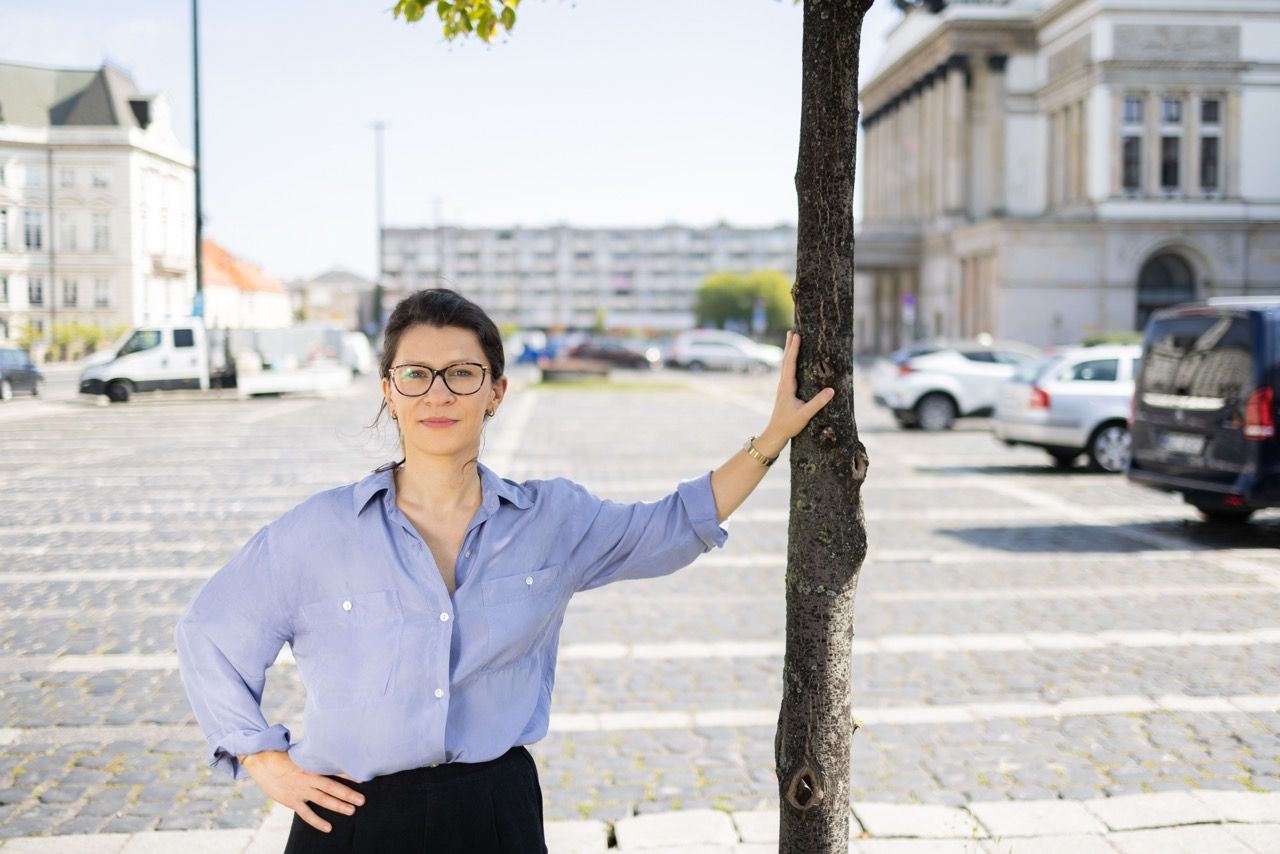 Zofia Boni, credit: M. Łepecki/NCN
Intuitively, one might assume that residents of Madrid are better adapted to heat than those in Warsaw simply because they’ve had more time to get used to higher temperatures.
Zofia Boni, credit: M. Łepecki/NCN
Intuitively, one might assume that residents of Madrid are better adapted to heat than those in Warsaw simply because they’ve had more time to get used to higher temperatures.
That was one of our hypotheses and the reason we chose to compare Warsaw, a city where residents have historically dealt more with cold, with Madrid, which is culturally more accustomed to heat. Our findings partially confirmed that intuition. Older adults living in Madrid tend to be more aware of how heat affects their bodies and health, and they’re better at recognising the moment when action is needed to avoid overheating. The differences are visible both in individual practices and in urban infrastructure.
But even if temperatures in Warsaw are objectively lower than in Madrid, Warsaw residents may find them more difficult to cope with. Our bodies, homes and entire cities are not adapted to prolonged heat. That’s why, paradoxically, dealing with 35°C in Madrid may be easier than 25°C in Warsaw.
That doesn’t mean, however, that heat isn’t a serious issue for older adults in Madrid – quite the opposite. Temperatures there are also rising, increasingly reaching 40°C in the summer. So, despite a certain level of acclimatisation, the problem is very much felt there as well.
Housing in the south is better suited to hot summers, so perhaps at least it doesn't become as much of a trap for seniors?
Construction methods have been adapted to high temperatures for decades: light-coloured facades, shutters – all designed to keep interiors at least a bit cooler. In Madrid, far more people have air conditioning than in Warsaw, but many use it very sparingly. Because of high energy costs, many people turn the air conditioning on for just 10–15 minutes to slightly cool the room – and then immediately turn it off. They simply cannot afford to use it more.
We’re talking about heatwaves, even though this summer in Warsaw hasn’t been particularly hot – a fact often used by those who question the existence of climate change. Have you also come across such attitudes among seniors during your research?
There are studies we referred to that suggest those most affected by the impacts of climate change are also more aware of its existence. Island communities are often cited here and indeed, in many cases, this awareness is high there. At the same time, however, there is often a lack of understanding that the extreme weather events we’re experiencing – such as heatwaves, wildfires, heavy rainfall and the resulting floods – are consequences of human-induced climate change.
What surprised us was the high level of awareness among our respondents. In both Warsaw and Madrid, older adults clearly understood that what they were experiencing was connected to climate change. In Warsaw, 71% of respondents in the thermal survey said that climate change affects their daily lives, and as many as 95% linked the increasing frequency and intensity of heatwaves to this phenomenon.
My impression is that this group – the elderly – recognised the seriousness of the situation earlier than others. This awareness stems from both their specific physiological and social vulnerability. We began this research in 2020, i.e. five years ago. Since then, a lot has changed – both in terms of rising temperatures and the way heatwaves are talked about today. The topic has clearly gained importance, and awareness of the risks associated with extreme heat has grown significantly.
Participants in our research said that even a few years ago, they anticipated that heat would become an increasing challenge for them, and they took concrete steps in response: some bought garden plots as a place to retreat, while others invested in simple things like electric fans.
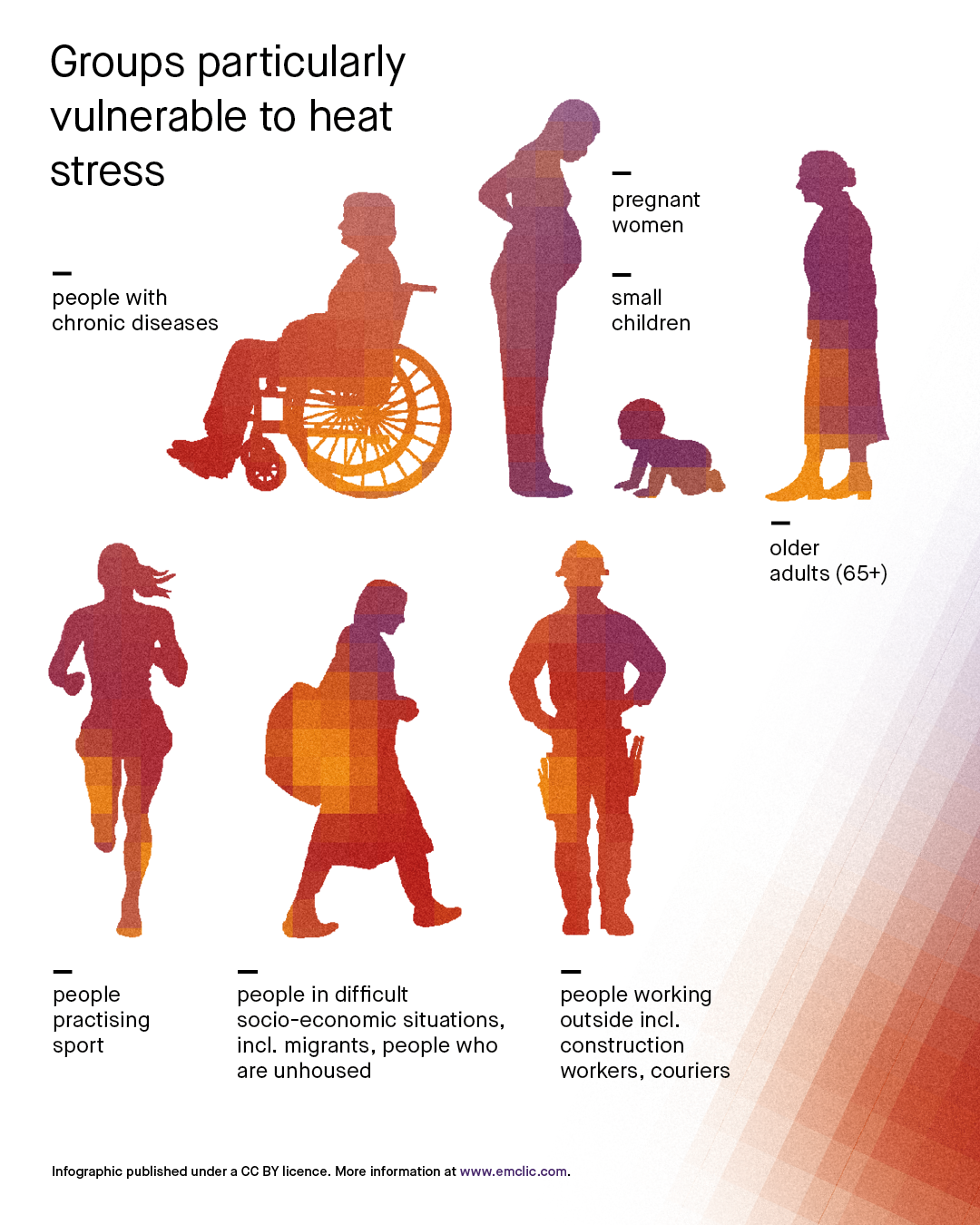 Groups particularly vulnerable to heat stress, source: EmCliC
We are talking about individual solutions. And how should cities prepare to make life easier for seniors?
Groups particularly vulnerable to heat stress, source: EmCliC
We are talking about individual solutions. And how should cities prepare to make life easier for seniors?
We explored this question during participatory workshops held this year as part of the Science and Society initiative. We were interested in what, from the perspective of older adults, should change in urban adaptation policies.
Participants shared very specific ideas. They pointed out that Warsaw lacks easy access to drinking water: fountains are scarce, hard to find, and often it’s unclear whether they’re even working. Many also mentioned the lack of shade in public spaces – even in parks, benches are often fully exposed to the sun, and reaching them, especially in the heat, can be difficult. One idea they came up with was to open cooling centres – which, as it turns out, were indeed launched in Warsaw this summer. But they also emphasised that, for many seniors, getting to these locations might be impossible – either because they’re too far away or require crossing overheated intersections and waiting at unshaded bus stops.
A particularly interesting idea was the so-called “cooling day camps”; that is, organised day trips outside the city to give older adults a break from the urban heat. There was also a proposal for municipal subsidies to help customise homes to rising temperatures; for example, funding for installing awnings or shutters that improve comfort during hot days. These suggestions became a starting point for further discussions with experts and city officials.
Do city officials understand and support these proposals?
Many adaptation measures are highly individual. The responsibility for coping with the heat largely falls on individuals, and social and economic factors play a huge role here – not everyone can afford to leave the city or install and use air conditioning.
But it is clear that the city is taking measures to mitigate the effects of high temperatures. One example is the introduction of “cooling spots,” opened for the first time this year – there are nearly 150 of these across Warsaw. These are public spaces where people can escape the heat and rest. There are also more and more drinking fountains being installed. However, communication remains a challenge – although maps showing the locations of cooling spots and water fountains exist, many seniors simply don’t know these resources are available or where to find them. Beyond the solutions themselves, we need better information and outreach to ensure this knowledge reaches those who need it most.
Systemic solutions that are accessible to all are crucial. Only such widespread and public measures can truly support those most vulnerable to heat stress. Adapting to heatwaves shouldn’t be just a private matter for each individual, but a part of urban policy, collective responsibility and climate justice.
Not everyone can afford to install or heavily use air conditioning – as we saw with the seniors in Madrid.
Air-conditioning is actually an example of so-called maladaptation, i.e. measures that seem helpful but may worsen the situation in the long run. Individual air conditioning does provide relief by cooling homes and improving thermal comfort, but it also carries negative consequences. These are not only health-related, as the body becomes less accustomed to high temperatures, but also environmental. Widespread use of air conditioners in cities increases the urban heat island effect and raises city temperatures and is also associated with increased consumption of fossil fuel energy.
So, while we improve conditions locally, we may simultaneously be making things worse for others. It’s important to talk about this because it highlights how uneven climate adaptation can be. We could end up with a situation where some people live in air-conditioned homes, work in air-conditioned offices, and drive air-conditioned cars, while others, without access to such solutions, experience the increasing impacts of heatwaves. This social dimension of adaptation and issues of climate justice are crucial to keep in mind.
Project “Experiencing Climate Change: A Transdisciplinary Research of Urban Overheating” (EmCliC) led by the team of Dr Zofia Boni, was funded by Norwegian and EEA grants through the IdeaLab competition. With additional support from the Science and Society programme, the team expanded their work to include social initiatives.
Together with senior women and men – those especially vulnerable to the effects of overheating – the researchers prepared a document that diagnoses the challenges posed by heatwaves in Warsaw, along with proposed solutions to help improve adaptation.
Science and Society is a programme aimed at involving the public in the research process – from posing questions to developing solutions and sharing results. NCN invited eleven Polish-Norwegian teams that had previously conducted projects under the GRIEG or IdeaLab competitions to participate. A database of all initiatives carried out within the programme will be published on our website soon.
Previous interviews with researchers about their work have been published in the #rozmowaNCN series.

